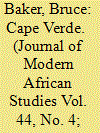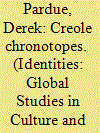|
|
|
Sort Order |
|
|
|
Items / Page
|
|
|
|
|
|
|
| Srl | Item |
| 1 |
ID:
075215


|
|
|
|
|
| Publication |
2006.
|
| Summary/Abstract |
This article examines the substance behind the claim that Cape Verde, a small archipelago state off the west coast of Africa, is the best country in Africa for political rights and civil liberties. Based on interviews conducted with 22 key informants in government, the judiciary, the legislature and civil society, it explores the electoral process, the political parties, the functioning of the National Assembly, civil and political rights, the judicial system, civil society and economic equality. It finds that Cape Verde's unique geography and history have played a key role in facilitating good governance, and an open and non-violent society that values the real political gains of 1991. However, democracy has not yet eradicated either gender discrimination, dependence on the diaspora or poverty.
|
|
|
|
|
|
|
|
|
|
|
|
|
|
|
|
| 2 |
ID:
160642


|
|
|
|
|
| Summary/Abstract |
The emergence of Kriolu or Cape Verdean Creole as a black identity should be understood in terms of chronotope, a dynamic iteration that combines time and place in the name of collective identity. The case of Cape Verdean migrants in Lisbon, Portugal, contributes to current debates on blackness as a ‘becoming’ and a complex set of practices by underscoring the role of encounters, both mundane and structural, in racialized formations. I draw from my fieldwork with Cape Verdean rappers and archival research in Lisbon between 2007 and 2013 to suggest that the particularities of Kriolu hold general theoretical lessons on the importance of migrancy and, by extension, space and temporality, in the process of racialization.
|
|
|
|
|
|
|
|
|
|
|
|
|
|
|
|
| 3 |
ID:
114637


|
|
|
|
|
| Publication |
2012.
|
| Summary/Abstract |
The use of the mobile phone to contact research subjects granted me privileged access to a body of poetic and humorous texts. This article examines Cape Verdeans' use of pass-forward text messages to express allegiances to different collective identities that provide information and inspiration for Cape Verdeans living in Portugal. They are used to foment and express solidarity between Cape Verdeans, Africans, Christians and Women. An analysis of their contents elucidates two aspects of belonging. Firstly, the personal and intimate which tends to the Self, in its yearnings for a better future and for intimate relationship, sought through religious communion and romance. Secondly, the political and discursive which foments community, imagined not only through nation, Pan-Africanism and gender, but also beyond any such boundaries towards an all-inclusive dimension of belonging, rooted in relations of solidarity.
|
|
|
|
|
|
|
|
|
|
|
|
|
|
|
|
| 4 |
ID:
106655


|
|
|
|
|
| Publication |
2011.
|
| Summary/Abstract |
Departing from the idea that the externalisation of the EU's immigration policy has been tacitly accepted and even incorporated in the legal corpus of nations around the Mediterranean basin, this study argues that the southern European boundary has been redrawn, and gradually dislocated southwards to establish a new de facto border in northern and western Africa. The study adopts a comparative analysis evaluating the social effects of this novel geopolitical dynamic in two of Europe's closest neighbours, Morocco and the Cape Verde Islands, and focuses on the quasi-involuntary development of a new migration paradigm in both countries, based on an informal incorporation nexus. This important change in local socio-political contexts primarily derives from a steady inflow of sub-Saharan migrants, and the challenges they pose to civility in two nations where civil society is only nascent. As passage to Europe becomes increasingly difficult, many migrants are transforming what were until recently two eminent migration source countries into 'transit countries', increasingly becoming hosts to permanent states of transience and liminality. Current legal categories used to identify these new migration flows, and the lack of adequate asylum discourses, are also problematised. The study further explores the nexus of inclusion and exclusion, and formal and informal modes of incorporation, of the 'African other'.
|
|
|
|
|
|
|
|
|
|
|
|
|
|
|
|
|
|
|
|
|